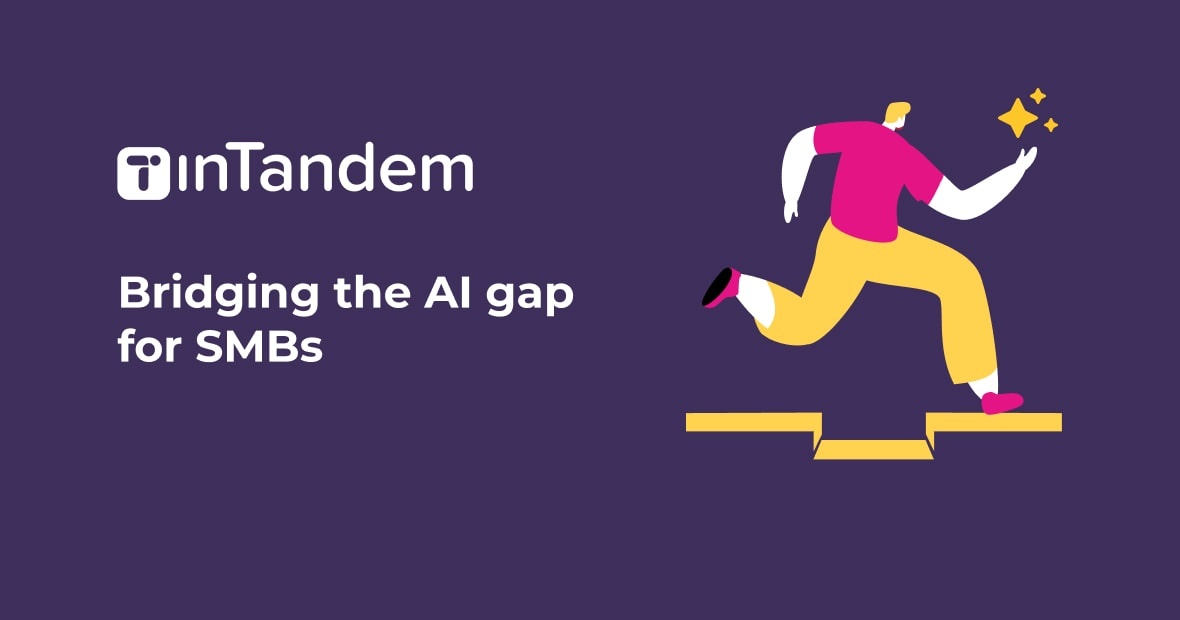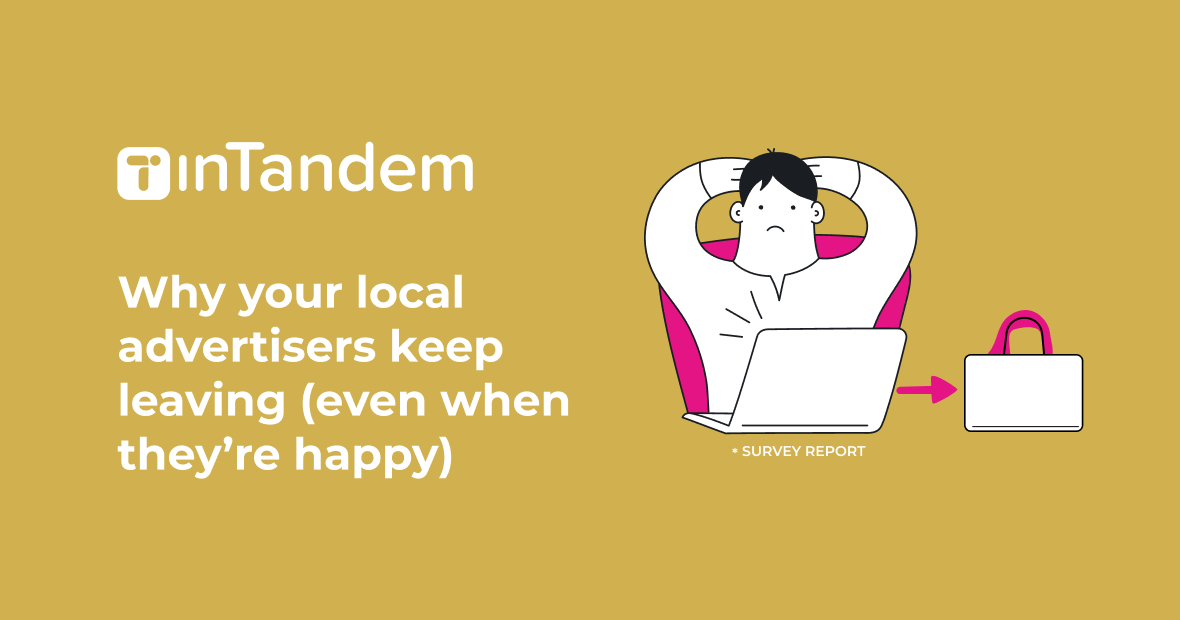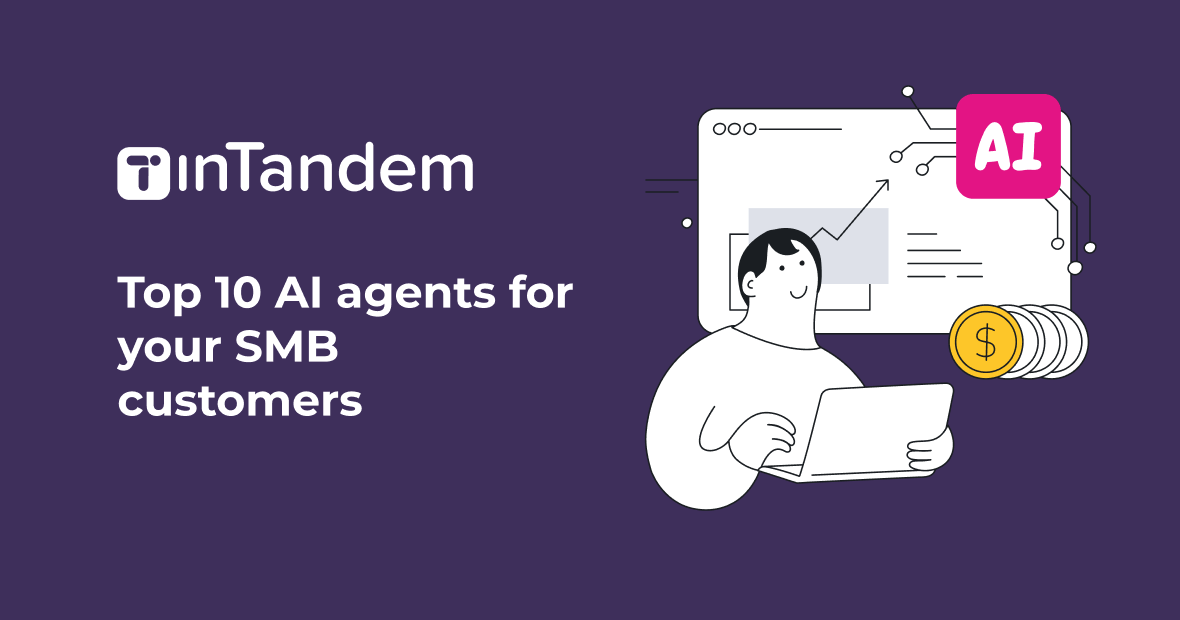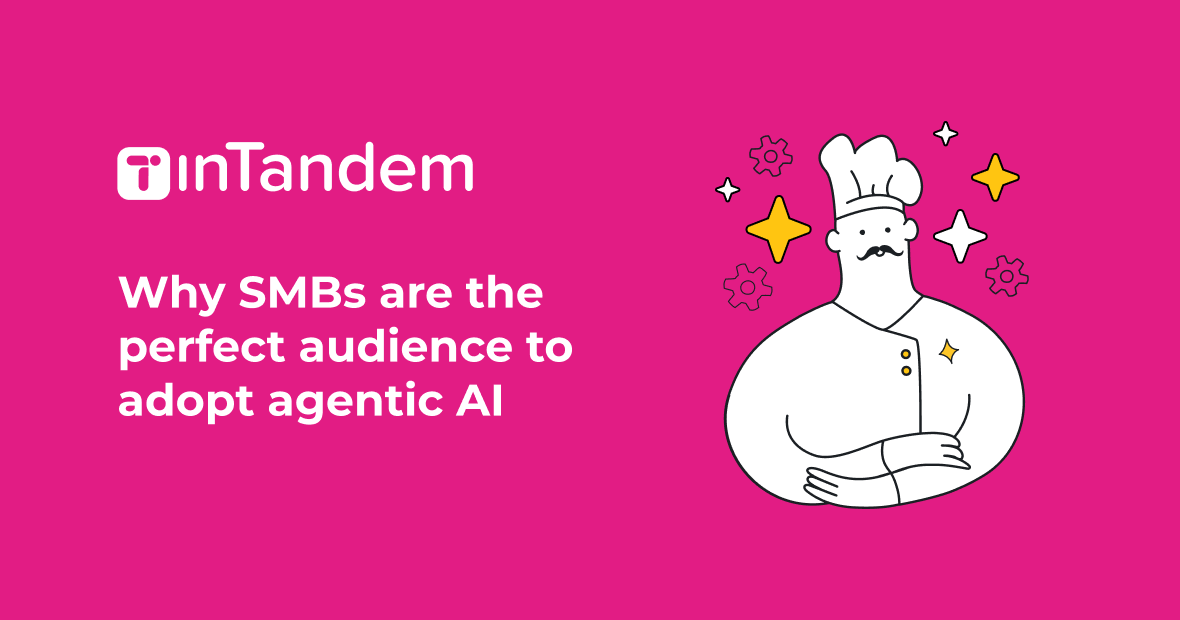To stay ahead of the curve and remain competitive, businesses need data to make informed decisions and have the confidence to make moves that will help with growth and propel success.
Enterprises have access to BI teams that are hired with the sole purpose of gathering data and translating it into business insights that help them better run their businesses. When needed, they also have the privilege of seeking professional guidance and advice provided by strategic consulting firms such as Gartner, McKinsey, and Accenture.
Small businesses, unfortunately, don’t have the resources or the luxury of hiring BI teams or strategic consultancy and often seek advice that is free and far more accessible. They might consult with a friend or look for answers online, but none of these options can be compared to a dedicated team or a top-of-the-line consultant.
Bridging this gap is exactly the type of value AI can deliver to SMBs. Our research has shown that when asked about their preferred use of AI, SMBs showed a clear preference for guidance related to strategic business decisions. This demonstrates that SMBs are not just “playing around” with AI, they are seeking real and impactful insights to optimize their business.
So, how do you bring AI solutions to SMBs that help them with their strategy and growth? And how do you get them to adopt such solutions, given the obstacles?
Those questions were the driving force behind the development of our latest strategic initiative: BizAI, and the answers can be found in our latest report, summarized in this article.
The AI gap for SMBs
While it’s true that AI saves time and increases efficiency, in its current state, it cannot (on its own) help small businesses owners on a strategic level. AI wisdom in the market is still rather generic, and based on global, public data. A generic tool like chatGPT is unable to deliver customized business advice that is optimized for the specific business.
For example, if you would type in the prompt “Write me an email promoting my services to my clients” into ChatGPT, without additional context, the answer would be very generic.
Without knowing the services I offer, how much revenue they generate, which marketing campaigns have worked well in the past, my audience, the tone and language my business uses, etc., OpenAI will make assumptions about the nature of my business and the response will be useless or in some cases even counter effective.
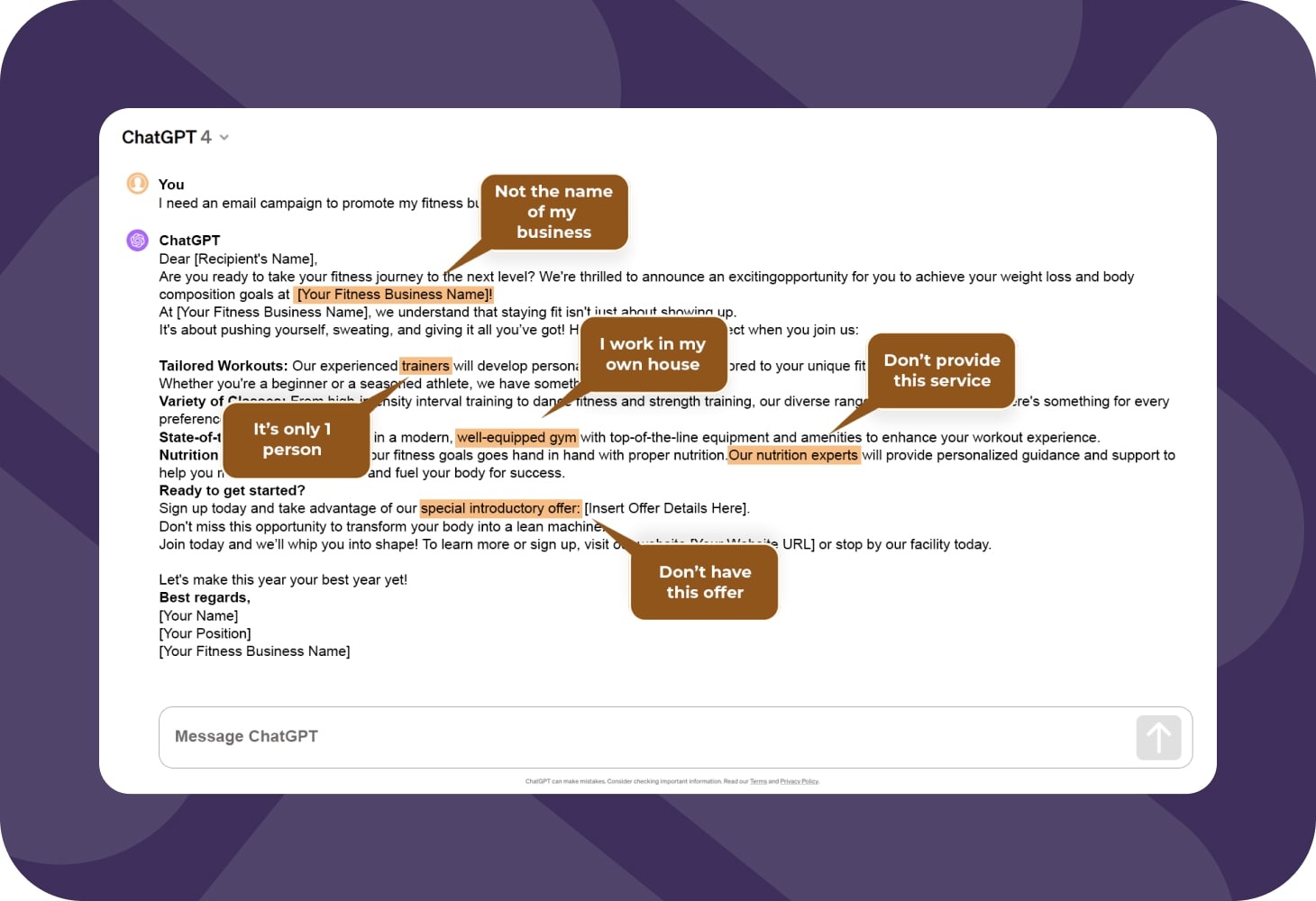
This is also the case with human business consultants. In order to provide beneficial advice they always need to learn about the specifics of the business at hand.
Now, you could be saying to yourself, ‘What’s the problem? I’ll just enter all the business information as part of the prompt and get a better response.’ And, in theory, you’d be right, but, unfortunately, asking the SMB to provide all the business information as part of every prompt or question is impractical. In addition, the reality is, most SMBs don’t even have all the relevant information available and organized.
Offering data insights and contextual advice
In early 2023, we started developing our vision, which officially rolled out as a beta product later that same year: BizAI – an AI-driven, personalized, fully contextual business advisor built for SMBs. It gets to know each SMB and can offer tailored advice, such as ideas for growth, pricing optimization, and cost-saving suggestions, as well as recommend day-to-day actions SMBs should take to optimize their business – calendar adjustments, responses to clients inquiries, creating marketing campaigns etc.
BizAI bridges the AI gap for SMBs in 2 main ways:
Offering data insights
By being built into vcita’s business management solution, BizAI is well equipped to handle all of the user’s inquiries about their business – no matter how complex. It uses the internal business data collected by the platform as part of the business day-to-day use, as well as external data to provide the most well-rounded answers and actionable suggestions.
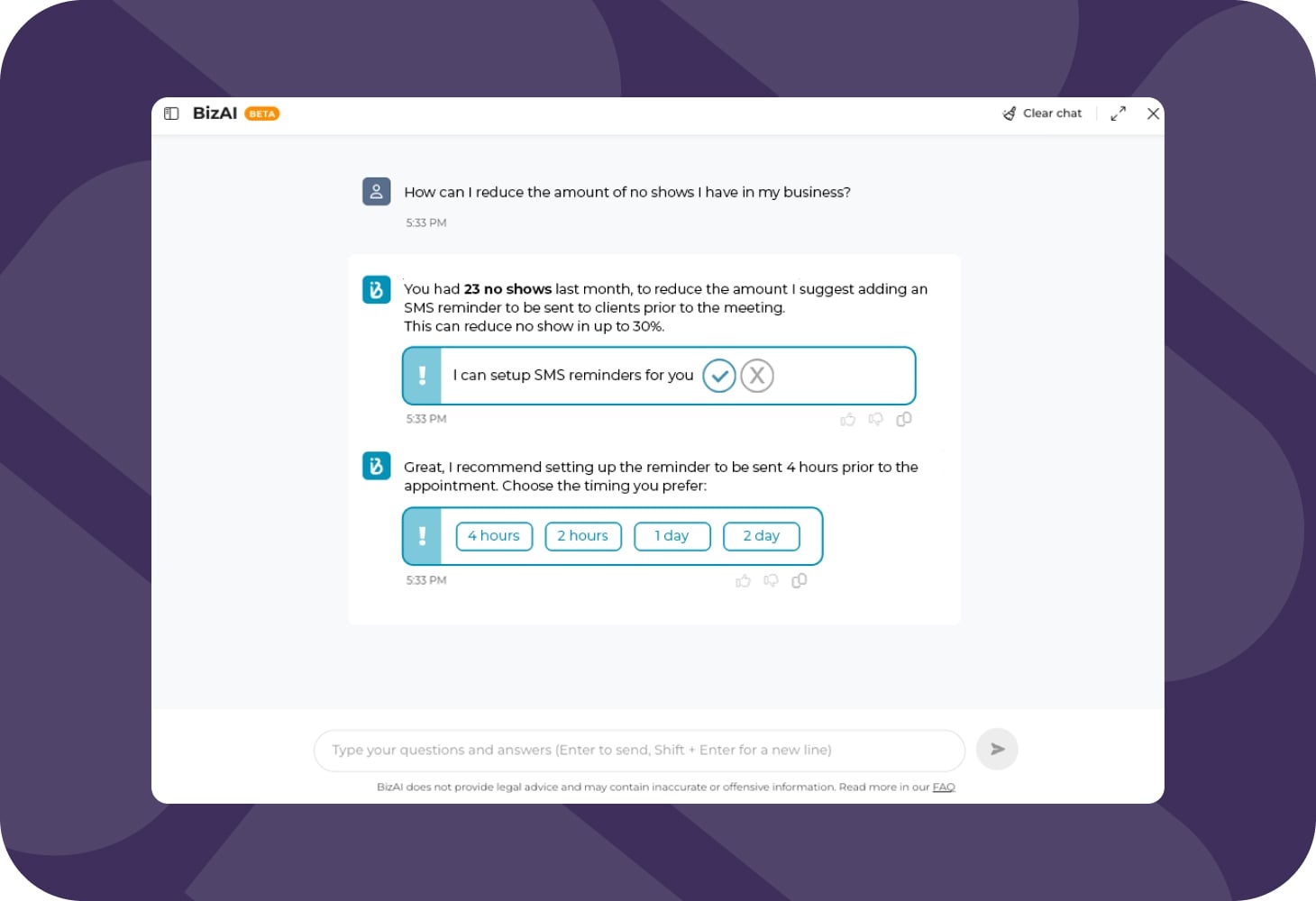
If we go back to the prompt example from before, “Write me an email promoting my services to my clients” would be all the user would need to input into BizAI, because BizAI already knows what services the business is offering, which campaigns worked best, who their target audience is, and so on.
This alone offers true value to small businesses by providing them with insights into data they weren’t exposed to before. For example, one of our BizAI users used the tool to check her pricing against her competitors. She was able to see that she was a bit underpriced and increased her revenue by upping her prices to match the competition. She saw immediate results from our AI-driven business advisor using data she would not have been otherwise exposed to.
And not only her, but 43% of users who tried BizAI returned within a week of their first usage, and 32% of users copied the chat’s answers to the clipboard, indicating that they were happy with the output and intended to use it.
Integration with everyday tasks
Another common challenge in the adoption of AI is the fact that SMBs simply don’t know when and where AI might help. While you and I are already using AI as part of our workdays, the average SMB might not think of AI as a place to go when they need assistance.
That’s why we made BizAI an inseparable part of our business management platform, with many integrated and contextual touch points that are presented to SMBs throughout their workday. For example, SMBs will be prompted to use AI when creating and pricing a new service, while writing their cancellation policy, when answering an inquiry from a promising prospect etc.
By creating prompts and providing SMBs with their answer without them asking , users can better understand how BizAI can help them in their day-to-day, and the results speak for themselves:
A vast majority of our BizAI users use contextual prompts from certain touchpoints within the platform, such as writing a service description for a new service, indicating that when pointed in the right direction, SMBs are more likely to adopt AI.
And we’re just getting started
In the near future, BizAI will recommend actions and show the SMB when and how these actions can be done. I’m excited about the idea of BizAI automating processes, for example – I envision it telling an SMB which clients should be contacted about a particular offer, and then going ahead and contacting these clients with a personalized message for optimized results.
Another example of such a use case could be automatically suggesting an open time-slot to a customer once it becomes available and optimizing the entire booking process.
BizAI will become fully integrated into the daily workflows of the SMB, making it an inseparable part of running their business.
Our vision for our partners
As a partner-driven company, we are building BizAI beyond the business advisor experience, and designing it to be a complete infrastructure for our partners to connect to via API. AI is to become a core component of the inTandem platform and serve as an engine that can be utilized by any partner application. We are currently accepting design partners for joint AI propositions, so if you are passionate about leveraging AI for the benefit of SMBs, let’s connect.
In addition, the vast data aggregated on our platform can tell the full story of the SMB audience: from detailed segmentation based on business behavior to elaborate performance reports. We can leverage this data to drive deep insights powered by AI, support partner business goals, and provide real-time alerts for opportunities.
Our mission is to make BizAI a powerful tool for our partners, aggregating data and making suggestions. BizAI can whisper in the ears of sales reps- letting them know which SMB clients are the best candidates for upsell, or highlight accounts that are at high risk of churn. It can also let our partners know which of their small business clients are expanding their staff or if a particular vertical is declining in growth and help them act on that insightful, aggregated SMB data.
Bringing value to SMBs via BizAI
Our latest report looks at the impact BizAI has had on our SMB users while discussing the lessons we’ve learned throughout our launch. To get to an average session time of 10 minutes, we needed to revisit and tweak the onboarding process and educate our SMBs via suggested prompts and strategic placement of our buttons allowing access to the tool, and we describe our entire process within the report.
In my opinion, BizAI can do a great job of providing small businesses with the data they so desperately need to make better-informed decisions about their business, and the sky’s the limit.
vcita will continue to expand BizAI’s capabilities for both its SMB users and our partners, making it an invaluable tool enabling stronger relationships, better support from the enterprise to the SMBs it serves, and a holistic approach to data, detailing the bigger picture for both audiences.
Visit our website to learn how your organization can offer AI solutions that truly bring value to their SMB clients.






















